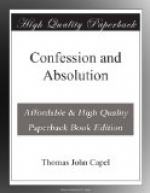All this, instead of encouraging the sinner, as opponents have it, to return and wallow in the mire of iniquity, does, on the contrary, make him gird up his loins, and walk with a firm but cautious step for the future. And this apart from the fact that one of the supernatural effects of this sacrament of penance is the bestowal of actual medicinal graces, whereby the soul is strengthened against relapsing, and for which reason regular and frequent confession is so earnestly encouraged.
5. To have a wise prudent spiritual adviser, to have an experienced physician of the soul, to have a merciful but strict judge of moral duty: is to have the greatest spiritual support on earth, even apart from the superadded sacramental character of such a minister. It is this blessed gift which the Catholic has in his legitimately-approved and authorized confessor.
Prejudice or ignorance can alone construe such an inestimable treasure, which brings peace of conscience and heavenly consolation, into “making the priest the keeper of a man’s conscience, and the destroyer of man’s spiritual liberty and of his responsibility to his Creator.”
How different are the opinions of thoughtful men, concerning this Tribunal of Penance, will be seen from the following: One is a Frenchman, who, unhappily, apostatized from the Catholic Church; the second is a distinguished German philosopher, who lived and died a Protestant; the third is one of the profoundest thinkers of our day, who, born in the Episcopal Church in England, served her some forty years, and then left her to enter the Catholic, Apostolic, and Roman Church.
The first of these—Voltaire—thus writes:
“The enemies of the Roman Church, who have assailed the salutary institution of confession, appear to have removed the strongest restraint which can be put upon secret crimes. The sages of antiquity themselves felt the importance of it."[61]
The second—Leibnitz—in his “System of Theology” says:
“The institution of sacramental confession is assuredly worthy of the divine wisdom, and, of all the doctrines of religion, it is the most admirable and the most beautiful. It was admired by the Chinese and the inhabitants of Japan. The necessity of confessing sin is sufficient to preserve from it those who still preserve their modesty; and yet, if any fail, confession consoles and restores them. I look on a grave and prudent confessor as a great instrument of God for the salvation of souls. His counsels regulate the sentiments, reprove vices, remove occasions of sin, cause the restitution of ill-acquired property, and the reparation of wrongs; clear up doubts, console under afflictions—in fine, cure or relieve all the evils of the soul; and as nothing in the world is more precious than a faithful friend, what is the value of that friend when he is bound by his functions and fitted by his knowledge to devote to you all his care, under the seal of the most inviolable secrecy?”




